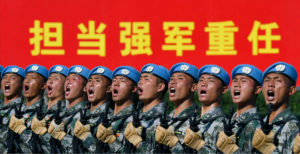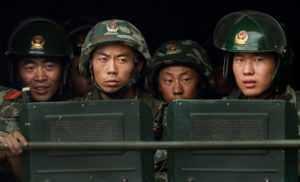Xi Jinping’s great moment is nearly upon us. This weekend, if the Pekingologists are correct, the Communist Party’s Congress will pave the way for him to become the longest-serving Chinese leader since Mao Zedong.
The Party has weathered the Covid storm, crushed opposition in Hong Kong and Xinjiang, and kept the economy afloat. Total recorded Covid deaths were kept to a tiny 15,000 (about the same as Scotland) while GDP growth was boosted to 8% in 2021. All of this was achieved while China sealed itself off from the world.
The Party has not so much learned to live with Covid restrictions as learned to love them. Although it’s now easier to enter the country (visitors must spend only ten days in quarantine rather than the previous 21), all kinds of other measures are still in force. The staging of the Congress this month seems to be one explanation: the Party does not want an embarrassing outbreak or lockdown to mar the political spectacle. But it’s unlikely that restrictions will go once the Congress is done. There seem to be several reasons for this, but chief among them is the fact the Party leadership has found the various Covid control measures to be very useful.
A self-imposed “walling off” is becoming the leitmotif of Xi’s China, with the CCP separating its people from the outside world through the creation of physical, political and economic barriers. The aim is to exclude disease from the national homeland, but also unwanted information, influence and pressure. During the Eighties, the leader who oversaw China’s opening up to the world, Deng Xiaoping, is reputed to have said: “If you open a window for fresh air, you have to expect some flies to blow in.” Xi is fed up with the flies: he’s closing the windows.
Take the new “Great Fence of China” along the country’s southeastern borders with Vietnam, Laos and Myanmar. The barrier is a substantial structure, clearly designed to last well beyond the likely duration of any pandemic. Yunnan province alone is reported to have earmarked $500 million for its construction. It snakes up and down steep hills, dividing mountain communities that long predate the existence of the border and obstructing unofficial cross-border movements of people and goods. More fences have been built, or rebuilt, along parts of the border where more restive minorities live, in Xinjiang and Inner Mongolia.
While these structures will block the spread of disease as well as subversion, none of this is to say that Xi is turning China into North Korea. The Party leadership knows that China’s prosperity depends upon international trade, that trade depends upon international flows of finance, and that national development requires skills and technologies that can only be acquired by studying or travelling abroad. So, there must be portals through which goods, money and certain people can pass. But at the same time the leadership is trying to secure its position by reducing the ability of foreigners to influence its politics, society or economy.
In the past few years, there has been increased talk of “decoupling” between the US and China and of “deglobalisation” around the world. But the vast majority of the focus has been on American efforts to sanction China. There has been much less attention on China’s efforts to decouple itself. This is partly a result of the United States turning the dollar-based financial system into a tool of foreign policy. Its case against Huawei, for example, was based on the company breaking American laws by trading with Iran and clearing the payments through the New York banks. China’s response has been to try to reduce its dependency on the US financial system.
The Party’s efforts to reduce foreign influence lie behind the restructuring of its entire economy towards what it calls dual circulation. It is trying, in effect, to create two economies: a domestic economic circuit, which is insulated from the rest of the world, and a global circuit that relies on political connections (the Belt and Road Initiative) to open markets in Asia, Africa and Latin America. The organising principle of both circuits is that they are controlled by the Party, and not subject to international pressure. Pure economic autarky is not possible for a China that depends upon global trade, but dual circulation is an attempt to create as much autarky as possible.
It’s worth remembering that all these efforts towards self-reliance stem from the Party’s need to avoid foreign pressure so that it can continue to oppress dissident voices in Xinjiang and Hong Kong, continue trading with vicious regimes from Myanmar to Iran, and prepare for war over Taiwan. They are, in other words, part of Xi’s decade-long drive to reassert Communist Party domination of all areas of life in China.
This overarching agenda, announced immediately after Xi was appointed General-Secretary of the Communist Party, is ”the great rejuvenation of the Chinese nation”. His vision is of a homogenous mass of people, stretching from Shanghai to Xinjiang, all loyal to his “five identifications”: identifying with the state, the unified Chinese nation, Chinese culture, the Communist Party and Chinese socialism. As a result, all threats to Party rule, any rival source of leadership, whether it be imams in Xinjiang or student leaders in Hong Kong, must be flattened.
The inward turn is also squeezing out foreigners — though not all of them, of course. The Party is happy to host certain skilled individuals, such as English language teachers and pet bloggers, who amplify its messages about how the Tibetan and Uyghur peoples have benefitted from Socialism with Chinese Characteristics. Equally, the few hundred thousand Southeast Asians toiling on its production lines are welcome to stay. But at the levels of business management and control, something significant is happening.
Ker Gibbs, who was President of the American Chamber of Commerce in Shanghai from 2019 to 2021, has watched the growing de-foreignerisation of foreign-owned firms in China. To some extent, this reflects the development of a new generation of skilled Chinese managers able to manage complex supply chains. But he also notes that the constant pressure piled on Americans and other foreigners is causing an exodus. “It’s just not fun anymore” he tells me. “The space to operate freely has become more and more narrow.” Gibbs notes the growing authoritarianism of Xi’s China over the past decade was already pushing foreign businesspeople to leave, even before the pandemic. The draconian Covid lockdowns, particularly in Shanghai, were the last straw for many. In a few years’ time, American firms in China may no longer be run by Americans.
The same exodus can be seen in Hong Kong, once the “Gate to China” but increasingly just another Chinese city. Xi’s crackdown on free speech, the Party’s assault on the rule of law, Covid restrictions and the slow but constant “mainlandisation” of the territory are steadily diminishing its attractiveness. Hong Kong is still an “air lock” through which China can access foreign capital, but foreigners are leaving, which is exactly what the Party wants.
At the same time, the Communist Party is pushing foreign enterprises to facilitate the establishment of party cells inside their operations. There will be twin chains of command, with one from head office and another from Beijing. When push comes to shove, head office will be far away, and Beijing will have the guns. Fearing the consequences, some businesses are taking the money and running. In the process, the Chinese economy is becoming insulated from foreign pressure.
At the beginning of 2022, when international concern about human rights abuses in Xinjiang became focused on businesses operating there, two Western companies responded in strikingly different ways. While American-owned Walmart took some products off its shelves and hunkered down, the French supermarket chain Carrefour did the opposite. It launched a “Xinjiang fine foods week” promotion. The reason is simple. Carrefour, once the largest foreign retailer in China, is no longer French. In 2020, it sold 80% of its Chinese business to a local company, Suning International. Chinese capital, and the Communist Party, now controls the business. And as a result, the ability of Western governments to influence the company’s behaviour or pressure China to change its policies in Xinjiang is now minimal.
In China, then, the walls are going up. A country that once headed towards openness is now closing. For all the Chinese leadership’s talk of globalisation, it has chosen to deliberately decouple from the world to ensure the survival of Communist Party control. When Xi is once again anointed on Sunday, he will do so knowing that his decade-long inward turn is finally bearing fruit.
Disclaimer
Some of the posts we share are controversial and we do not necessarily agree with them in the whole extend. Sometimes we agree with the content or part of it but we do not agree with the narration or language. Nevertheless we find them somehow interesting, valuable and/or informative or we share them, because we strongly believe in freedom of speech, free press and journalism. We strongly encourage you to have a critical approach to all the content, do your own research and analysis to build your own opinion.
We would be glad to have your feedback.
Source: UnHerd Read the original article here: https://unherd.com/




